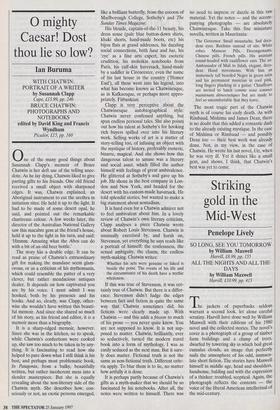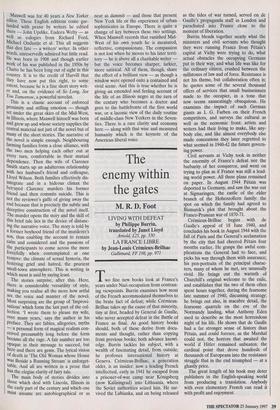Striking gold in the Mid-West
Penelope Lively
he jackets of paperbacks seldom warrant a second look, let alone careful scrutiny. Harvill have done well by William Maxwell with their editions of his 1980 novel and the collected stories. The novel's cover is a photograph of a group of timber farm buildings and a clump of trees, dwarfed by towering sky in which boil great cumulus clouds, an image that perfectly nails the atmosphere of his odd, immacu- late short fiction. The stories have Maxwell himself in middle age, head and shoulders, handsome, balding and with the expression of a thinker: troubled, sceptical. Again, the photograph reflects the contents — the voice of the liberal American intellectual of the mid-century. Maxwell was for 40 years a New Yorker editor. These English editions come gar- landed with praise by writers he edited there — John Updike, Eudora Welty — as Well as eulogies from Richard Ford, Michael Ondaatje et al. This all suggests that dire fate — a writers' writer. In other words, unreservedly admired but little read. He was born in 1908 and though earlier work of his was published in the 1950s by Chatto he has been long out of sight in this Country. It is to the credit of Harvill that they have now put this right, to some extent, because he is a fine short story writ- er and, on the evidence of So Long, See You Tomorrow, a powerful novelist. This is a classic account of enforced proximity and stifling emotion — though set under the great skies of the Mid-West, in Illinois, where Maxwell himself was born and grew up and whose society supplies the central material not just of the novel but of many of the short stories. The narrative of the novel is simple enough. Neighbouring farming families form a close alliance, with the two men helping each other out at every turn, comfortable in their mutual dependence. Then the wife of Clarence Smith starts up an adulterous relationship with her husband's friend and colleague, Lloyd Wilson. Both families effectively dis- integrate and in a hideous climax the betrayed Clarence murders his former friend and then commits suicide. This is not the reviewer's gaffe of giving away the end because that is precisely the subtle and deceptive construction of the novel itself. The murder opens the story and the skill of this brief tale lies in the device of distanc- ing the narrative voice. The story is told by a former boyhood friend of the murderer's son, thus enabling the account to remain calm and considered and the passions of the participants to come across the more forcefully when contemplated at one remove: the climate of sexual hysteria, the festering grief and hatred, the prurient small-town atmosphere. This is writing in which most is said by saying least.
The stories surprise, after this. Here, there is considerable versatility of style, making you realise all the more how artful are the voice and manner of the novel. Most surprising are the group of 'Improvi- sations' which form the last part of the col- lection. 'I wrote them to please my wife, over many years,' says the author in his preface. They are fables, allegories, myths a personal form of magical realism con- ceived presumably long before the form became all the rage. A fair number are too opaque in their message to succeed, but here and there are gems. The lyrical vision of death in 'The Old Woman whose House was Beside a Running Stream' is unforget- table. And all are written in a prose that has the elegiac clarity of fairy tale. The main body of stories divides into those which deal with Lincoln, Illinois in the early part of the century and which one Must assume are autobiographical or as near as dammit — and those that present New York life or the experience of urban sophisticates in Europe. There is quite a change of key between these two settings. When Maxwell records that vanished Mid- West of his own youth he is measured, reflective, compassionate. The compassion is not lost when he moves to his later terri- tory — he is above all a charitable writer — but the voice becomes sharper, larkier, more satirical. All of them, though, share the effect of a brilliant view — as though a window were opened onto a contained and vivid scene. And this is true whether he is giving an extended and feeling account of the life of an Illinois negro at the turn of the century who becomes a doctor and goes to the battlefronts of the first world war, or a laconic view of the daily routine of middle-class New Yorkers in the Seven- ties. There is a rare clarity and economy here — along with that wise and measured humanity which is the keynote of the American liberal voice.



































































 Previous page
Previous page